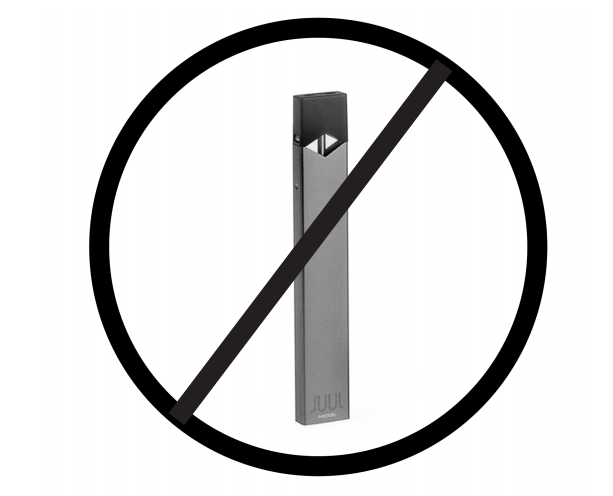Why JUULs Aren’t Cool
May 3, 2019
The new JUUL trend among teens could be leading them down a torturing road of addiction. If the popularity of this e-cigarette continues to grow as it has, then today’s teenagers may be putting themselves in danger.
The JUUL e-cigarette came out in July of 2017 and has blown up since then. Because it was just recently released, scientists don’t know the long-term effects of this nicotine device. The JUUL contains the highest nicotine levels of all e-cigarettes on the market, which is causing teens to become addicted to nicotine at a faster rate. Salt nicotine is used in JUULs instead of freebase nicotine, which allows the nicotine to enter the bloodstream easier, and it makes the vapor less harsh so a user can inhale more at one time. Benzoic acid, a nitrogen bonding agent, is found in JUULs in greater amounts, than other e-cigarettes. This acid is used to increase the potency of nicotine salt, but it has some negative side effects. It can cause sore throat, coughs, abdominal pain, nausea and vomiting. However, most teens don’t know about the chemicals found in JUULs, so they continue to use them.
There are a few reasons as to why teens begin “juuling”. According to a Truth Initiative Qualtrics Survey, young people begin using JUULs because their friends use them, there’s a variety of flavors, they’re less harmful than other forms of tobacco, and they can get a “buzz” from them. JUULs are also small and slim, so a user can hide it virtually anywhere. The fruity flavors keep teens coming back for more, which is why they’re so popular.
A Truth Initiative analysis found that more than half of 15-17-year-olds reported using a JUUL three or more days in the last month. These factors plus the amount of nicotine in a JUUL is causing the addiction rate in teenagers to rise.
Most teenagers think that they won’t get addicted, but it’s easier to get an addiction than they think. Nicotine is almost as addictive as cocaine and it’s more addictive than alcohol. Since your brain isn’t finished developing until around 25, getting a nicotine addiction before that age can affect the way your brain develops. Brain imaging studies have shown that adolescents who began smoking as a teen had reduced activity in the cognitive behavior and decision-making portion of their brain. It also showed greater impulsivity and increased sensitivity to other drugs.
Although JUULs may seem cool, using them can be dangerous. If this is a bad habit you have started, think about your risk of getting addicted and the many chemicals that could have a harmful effect on your body. Do something good for yourself instead.





































